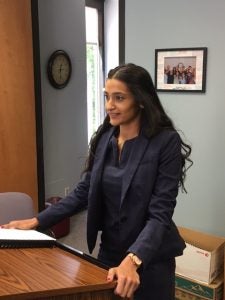About Our Clinic

Appellate Litigation Clinic student delivers a remote oral argument before the United States Court of Appeals for the Fourth Circuit .
The Appellate Litigation Program has been one of the core clinical programs at Georgetown University Law Center for over forty years. We count among our alumni a U.S. Court of Appeals judge; many attorneys with federal agencies and the Department of Justice; law professors; former Supreme Court law clerks; and partners specializing in appellate practice with major law firms.
For the past three years, Professor Erica Hashimoto has directed the clinic. It is, in a real sense, a small appellate litigation law firm staffed by one senior partner (Hashimoto), two junior partners (highly qualified attorneys in a two-year fellowship program), sixteen associates (3L or 4E students enrolled in a year-long, fourteen-credit clinic), and an office manager.
The clinic caseload includes civil and criminal appeals, many involving lawsuits against the federal government or states. These cases expose our students to intensive practice in three federal circuits (the D.C., Fourth, and Eleventh Circuits) as well as before the Board of Immigration Appeals. Because it is a year-long clinic, many clinic students are able to experience the full life of an appellate case, including drafting and filing opening briefs, analyzing response briefs filed by opposing parties, drafting and filing reply briefs, and then preparing for and doing oral arguments. The clinic has also had four cases reach the United States Supreme Court on grants of writs of certiorari.
The program provides intense training in the art of oral and written advocacy as it is practiced in some of the highest courts in the nation. The clinic strives to provide the best representation possible, comparable to that provided by the best appellate firms in the country. Because many of our students come to the clinic with little (if any) practice in appellate courts, the process of writing briefs and preparing for oral argument involves a steep learning curve and many hours of work. In return, students have the satisfaction of providing the highest quality representation to clients who need their help.